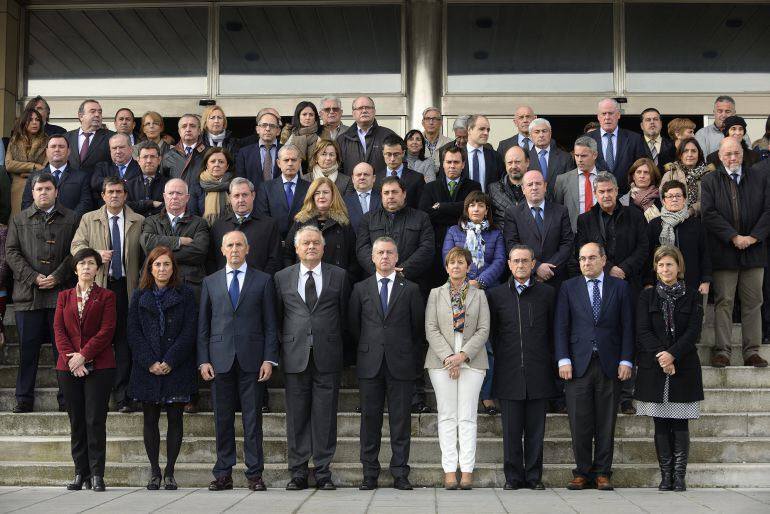by Emily Green | Dec 3, 2015 | events, Features |
 The Basque Research Team engaged in a conference call with Ander Bergara Sautua, the Head of Institutional Cooperation at Emakunde, the Basque Institute for Women, on December 3. Ander shared details of the ongoing annual forum, an important campaign that spans the course of three months. Since October 5, Emakunde has been collaborating with representatives from public administration, the private sector, and schools to promote and implement their many gender equality initiatives. More specific outcome documents from the forum, which last year brought together around 100 companies and 500 participants, will be released following the end of the campaign on December 18.
The Basque Research Team engaged in a conference call with Ander Bergara Sautua, the Head of Institutional Cooperation at Emakunde, the Basque Institute for Women, on December 3. Ander shared details of the ongoing annual forum, an important campaign that spans the course of three months. Since October 5, Emakunde has been collaborating with representatives from public administration, the private sector, and schools to promote and implement their many gender equality initiatives. More specific outcome documents from the forum, which last year brought together around 100 companies and 500 participants, will be released following the end of the campaign on December 18.
The forum aims to increase implementation of Emakunde’s many educational training programs. Ander described a two-sector approach to spreading the word. Within the educational sector, Emakunde trains primary and secondary school teachers on material aimed at preventing violence against women. Within the private sector, the institute works with corporations to increase gender equality within the workplace. From working to eliminate sexual harassment to drafting gender-sensitive clauses for company contracts, Emakunde’s programs seek to promote more inclusive corporations. Emakunde rewards companies that have exceptional progress through subsidies.
(more…)

by Daisy Caballero | Dec 1, 2015 | Slideshow |

Equal representation in Basque Parliament
Gender equality is a subject of high debate around the world. In order to judge the progress of a country with regard to equality, we must look at how every individual within society moves forward to develop a life for herself or himself. Isn’t this what true progress is all about? If this is true progress, then the progressive Basque Country is playing their cards right.
Emakunde, the Basque Institute for Women, promotes gender equality within the Basque Country. Emakunde’s purpose is to evaluate, promote, advise and coordinate Basque equality policies. They aim to raise awareness about equality between women and men. The organization not only works hand in hand with public administration to ensure the implementation of public policies that support gender equality, but also work with civil society to promote equality amongst its citizens. Emakunde monitors policies of public institutions in the fields of health, education, economy, employment, culture, and social services to ensure they offer equal services to Basque citizens. Their work is important because they prepare legislation, keep reports on the potential outcomes, and manage several institution networks that advocate equality.
The 4/2005 Equal Opportunities Between Men and Women Act is a crucial piece of Basque Country legislation that seeks to ensure gender equality. The act dates back to the U.N.’s approval of the Elimination of all Forms of Discrimination Against Women. The 4/2005 Equal Opportunities Between Men and Women Act provides protection for women and men against unfair treatment and also introduced organizations such as Emakunde. The act addresses areas where women and men might suffer inequality. The goal of 4/2005 is to defend citizens of both genders in the public and private sector in the Spanish Autonomous Region of the Basque Country. Article 3 explains its general principles, which affects institutions, organizations, behaviors and public power. Some of these principles are equal opportunity, equal treatment, appreciation for differences, respect of gender perspective, and balanced representation and coordination. Throughout the act, there is a clear idea of the necessity and beneficial nature of gender equality. A country, region or a community must have the responsibility to provide a secure and safe environment for individuals to advance and develop their skills.
Emakunde and the 4/2005 Equal Opportunities Between Men and Women Act have greatly influenced the Basque Government. The parliament of the Basque country is composed of seventy-five deputies, who are responsible of representing the three provinces of the Basque autonomous community. The work done by institutions such as Emakunde, have helped more women integrate into the political life. As of 2015, there are thirty one elected women in parliament and forty four men. These numbers show a relatively small gap between women and men. Since the 4/2005 Equal Opportunities Between Men and Women Act was passed, there has been an increasing amount of women’s representation in government, moving from 55% women in 2006 to 58% in 2009. The Basque autonomous community has made important strides in the field of gender equality for the good of its citizens. What the future holds for this region is unknown, but the Basque country will continue developing innovative policies to tackle gender inequality.
Sources
http://www.emakunde.euskadi.eus/u72-home/es
http://www.legebiltzarra.eus/eu
http://basquestudies.boisestate.edu/wp-content/uploads/2012/09/The-Basque-Country.pdf
http://www.irekia.euskadi.eus/en/areas/7-presidents-office/albums#middlehttp://www.irekia.euskadi.eus/en/areas/7-presidents-office/albums#middle

by Laura Munoz Galindo | Dec 1, 2015 | Slideshow |

Thomas Krens and Frank Gehry observing the foundations of the Guggenheim Museum in Bilbao
“Seduction consists of having people wish for something that you wish for without you having to ask for it”, says Thomas Krens, the Guggenheim’s Senior Advisor for International Affairs, “It’s all about the transfer of desire.” In 1991, Krens met with Basque officials and the Basque Nationalist Party to negotiate the details of establishing the Guggenheim Museum of Bilbao. The Basques were very hesitant about the project, and didn’t want to accept it prior to resolving areas of distress. Some problems that were presented in this negotiation centered upon economic issues, the national identity and globalization in the Basque country, and the “Bilbao effect.”
Krens wanted to negotiate with several cities to create a Guggenheim franchise. Bilbao’s uniqueness caught his attention, although he had originally pictured Guggenheim in a big European city rich with history, art and flair of modernity. Bilbao had most of these features, but was far from what Krens pictured as glamorous. On the one hand, Bilbao’s authorities mainly wanted the Guggenheim museum to help revitalize their city and they knew that economic activity would increase from tourism centered upon the museum. On the other hand, the Basques were hesitant because they couldn’t exactly decipher Krens’ intentions. There had been a lot of rumors that he wasn’t a serious guy and that his partners were unsure of the deal.
McGuggenisation is a term that critics used to describe how the museum impacted Bilbao and the rest of the world. It suggests Americanization and spreading of American cultural ideals and norms. One could say that the arrangement offered by the Guggenheim Foundation to the Basque regional government was part of a strategy of expansion aimed at establishing a chain of Guggenheims around the world. Seen as a global strategy, critics didn’t quite agree with the pact that the Basque Country would be making with Krens and his partners. Some believed that accepting the establishment of the museum would increase American cultural influence and dominance in Europe. The critics were not quite sure if the deal would have a positive or negative economic impact in Bilbao and they worried about the Guggenheim’s impact on the Basque Country’s globalization efforts. They were also afraid that the Basque cultural identity and unique culture could be at risk once the Americans come in. Little did they know, the Guggenheim would actually help Bilbao and the Basque Country tremendously. The museum drew tourists from all over the world in the first four years, bringing an estimate of almost four million visitors.
The increase in tourism greatly helped increase Bilbao’s economic progress. The “Bilbao effect” refers to how the museum transformed the city to a flourishing modern tourist destination. Three years after the museum was inaugurated, over 110 millions of dollars was raised by the regional government, which was more than enough to cover construction costs. The numbers of tourist increased and the Basque Country’s economy seemed to prosper each year due to a high amount of visitors in the Bilbao.One can conclude that despite the museum’s global and powerful franchise, the Basques have been able to remodel the franchise and imbue it with their own vision and strong cultural contributions.
Works Cited
Lee, Denny. “Bilbao, 10 Years Later”. The New York Times 23 Sept. 2000.
McNeill, Donald. “McGuggenisation? National Identity and Globalization in the Basque Country” Political Geography 19.04 (2000): 473-94. Print.
Zulaika, Joseba. Cronica de una Seduccion. Nerea, 2000. Print.
Alguien más que ha entendido las causas y las consecuencias del Guggenheim Bilbao
 The Basque Research Team engaged in a conference call with Ander Bergara Sautua, the Head of Institutional Cooperation at Emakunde, the Basque Institute for Women, on December 3. Ander shared details of the ongoing annual forum, an important campaign that spans the course of three months. Since October 5, Emakunde has been collaborating with representatives from public administration, the private sector, and schools to promote and implement their many gender equality initiatives. More specific outcome documents from the forum, which last year brought together around 100 companies and 500 participants, will be released following the end of the campaign on December 18.
The Basque Research Team engaged in a conference call with Ander Bergara Sautua, the Head of Institutional Cooperation at Emakunde, the Basque Institute for Women, on December 3. Ander shared details of the ongoing annual forum, an important campaign that spans the course of three months. Since October 5, Emakunde has been collaborating with representatives from public administration, the private sector, and schools to promote and implement their many gender equality initiatives. More specific outcome documents from the forum, which last year brought together around 100 companies and 500 participants, will be released following the end of the campaign on December 18.



